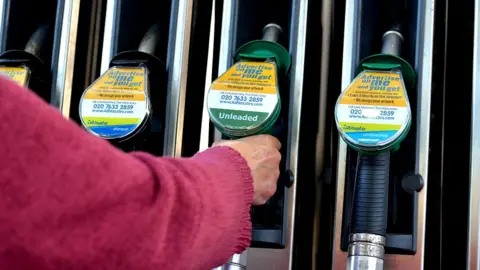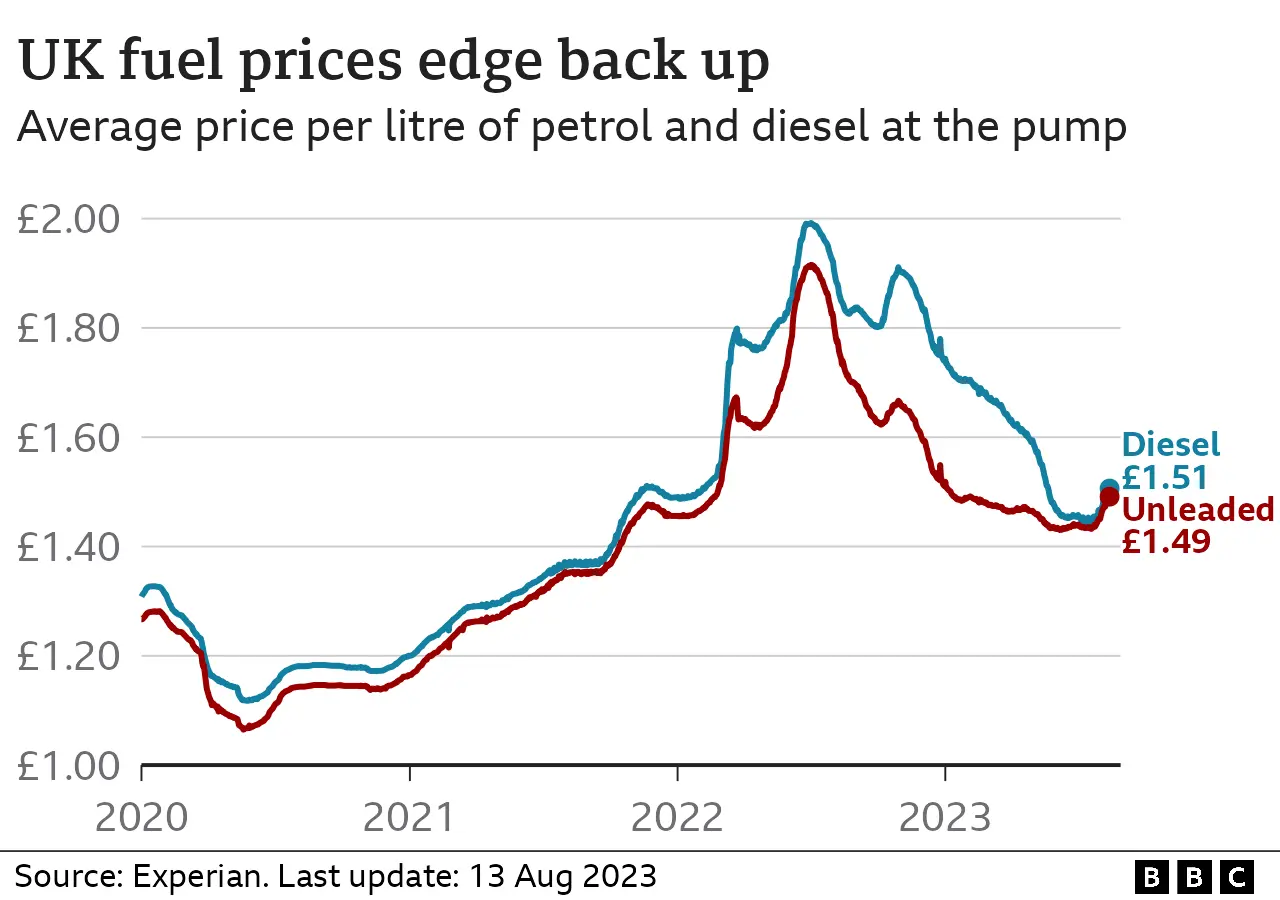Petrol prices: Why are they going back up?
 Getty Images
Getty ImagesMotorists will have noticed that the price of petrol and diesel has been creeping up in recent weeks.
These rising costs may pile further pressure on families whose budgets are already being squeezed.
What is happening to petrol prices?
Petrol and diesel prices have been on a rollercoaster ride this year.
Recent data from 13 August puts petrol at an average of 149.1p per litre on UK forecourts. In just two weeks, it has shot up by more than 4p and it marks the highest price seen since February.
Diesel stands at an average of 150.6p per litre - a level not seen since late May.

Although it now costs about £82 to fill up a 55-litre family car, prices have fallen back from the record highs seen last summer, which were sparked by Russia's invasion of Ukraine.
Luke Bosdet, the AA's spokesman on road fuel prices, said that this recent surge would, however, "lump pressure back on diesel users, particularly on small businesses".
Why are prices going up now?
Fuel prices in the UK move together with changes in the price of crude oil - which it is made from.
They are also affected by the exchange rate between the pound and dollar, as crude oil is traded in dollars. A weaker pound would mean that fuel gets more expensive.
Oil prices have risen in recent weeks as producers have tried to restrict output. Oil rich nations such as Saudi Arabia and Russia that form part of a group called Opec+ have cut back production.
They are grappling with slow demand as economies around the world struggle with high prices and the adjustment after the Covid pandemic.
The West has accused Opec of manipulating prices. As the biggest exporter and the leader of the pack, Saudi Arabia wants oil prices to stay elevated to make sure it has a steady stream of income while it tries to diversify its economy.
Livia Gallarati, an oil markets analyst at Energy Aspects, said that prices could grind higher still because of supplies being dented. She suggested Brent crude, the international benchmark for oil prices, could even move above $90 (£71) per barrel.
Supplies have also been affected by recent outages at oil refineries across the United States and Asia.
Oil prices jumped following Russia's invasion of Ukraine, with Brent crude hitting more than $120 a barrel in June 2022.
Russia used to be one of the world's largest oil exporters, but that was before punishing sanctions were imposed by the West.
After peaking in summer last year, oil prices fell back to a little above $70 a barrel in March this year amid concerns over weak demand.
What is being done to bring prices down?
Experts have said that motorists shouldn't expect petrol prices to go up much more unless garages and supermarkets decide to take a bigger cut - or margin - per litre sold.
The price of diesel, however, might rise in the autumn and winter because large parts of Europe rely on it for their heating.
Retailers said in July that they will to work with the UK's competition watchdog to set up a scheme to allow motorists to compare live fuel prices online.
It came after the Competition and Markets Authority (CMA) found that weak competition meant that the average annual supermarket margins on fuel had increased by 6p per litre between 2019 and 2022 - equivalent to £900m in extra costs for drivers.
RAC fuel spokesman Simon Williams said that despite the recent announcement, "there is still far too much regional variation in prices, particularly among the big four supermarkets, which unfairly penalises drivers in some areas."
He urged drivers to shop around where they can in a bid to save cash.
In March, Chancellor Jeremy Hunt also announced that fuel duty - a tax motorists pay when buying fuels such as petrol and diesel - would be frozen for another year, having been cut by 5p the year before.
It will cost the government more than £5bn and think tanks such as the Institute for Government have suggested it might sit awkwardly with its climate-related pledges.

How to save money on petrol and diesel
- Watch your speed: The RAC says 45-50mph is the most efficient speed to drive for fuel efficiency
- Switch off the air conditioning: Extra energy is needed to power a car's air conditioning system and turning it on can increase your fuel consumption by up to 10%, according to the AA
- Check your tyre pressure: Underinflated tyres will use up extra petrol. Check your pressures regularly, especially before heading off on a long journey

